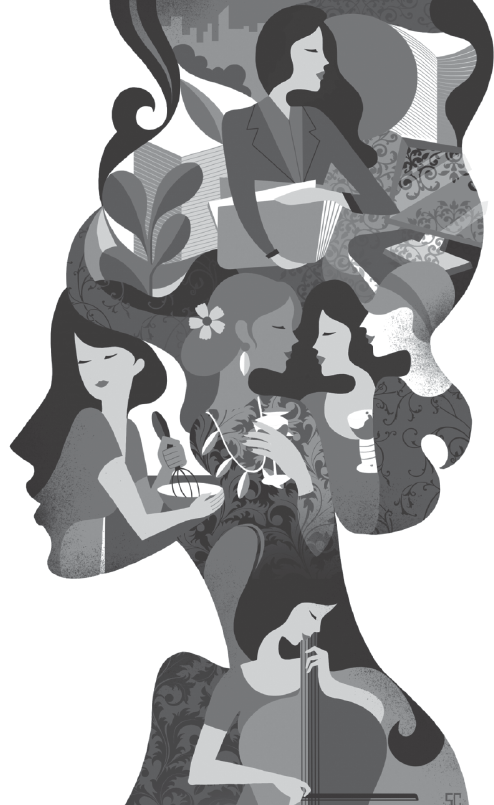 |
| SONG CHEN/CHINA DAILY |
More than just for pack of 'shrill voices'
The relevance of March 8 is now lost on many, feminists say
A topic to gain mild traction on Chinese social media earlier in the month was "Happy 3.8".
While some women and men simply posted greetings on International Women's Day, a good number of related messages came from vendors of clothing, makeup and confectionery.
March 8 seemed like a good day for business.
Born out of movements against injustice more than a century ago, the day's original meaning is now lost on many, feminists from China and abroad, say.
A world day for men is also celebrated each year since the 1990s. But Nov 19 isn't as marked in significance.
"For feminists or women (in China) who understand the history of March 8, the day is a symbol of women's rights, of equal rights, but for most others it is commercialized-a day to do some shopping," says Feng Yuan, co-founder of Equality, a Chinese NGO.
Similar inferences can be drawn about other countries while searching the Web.
At a time when the world is stunned by reports of brutality against women by militants of the Islamic State and Boko Haram, in Syria and Nigeria respectively, and when gender discrimination exists in violent and non-violent forms elsewhere, Women's Day cannot be seen just as a milestone for the "sisterhood of shrill voices", feminists say.
And, the political label that was used against 19th-century feminists in the West hasn't gone away.
In large parts of the world, the feminist stereotype even today is of an angry middle-class woman with a high-pitched voice. But men alone aren't promoting that image.
"Many women in Australia don't want to call themselves feminists because they think it's a dirty word, it shows aggressive behavior, but these are the very same women who have reaped the rewards of the feminist movement," Australian scholar Clare Wright told her audience at the Bookworm Literary Festival in Beijing last weekend.
In his March 8 interactions with some deputies to the National People's Congress in Beijing, President Xi Jinping said that China needed the contributions of women more so now.
Harry Porter actress Emma Watson told a gender-arts forum in New York that if women do not continue to struggle for equal rights and opportunities, it would take decades before the pay gap based on gender is bridged. Making her statement on that day, Ranjeet Rajan, a federal lawmaker in New Delhi, rode on a Harley Davidson to parliament.
Social expectations
In China, feminism's history is relatively new, owing partly to the country's occupation with wars earlier. Activists started to noticeably surface after 1995. That year, a United Nations' conference was held in Beijing defining women's rights worldwide and fiery speeches were made by attendees, including now US presidential hopeful Hillary Clinton.
Grassroots organizations for women appeared in the country around 2000.
"After New China was formed in 1949, women's liberation was helped by government under the ideals of socialism," says Li Dan, director, Crossroads Centre, a Chinese NGO.
But while Chinese women have become much more open about their sexuality in recent years and are increasingly assertive in dealing with everyday issues at work or home, their representation in popular culture is still shaped by the male view, which is often dogmatic and conservative.
"In movies and on TV, you will see women longing only for love and marriage-everything that attaches them to men," Li says.
For Beijing-based artist Wang Yanyun, many young Chinese women struggle to break free from social expectations surrounding appearance and status.
"Some women feel they can earn respect by marrying a wealthy man or getting a nose job done." The 25-year-old describes such notions as "short-sighted".
Wang held a solo exhibition of her work, Ink, at the city's 798 art space in 2011. It involved painting in Chinese characters gender slurs on her nude body to make her point: women tainted by the biases they face.
On March 7, university campuses in the country celebrated "girls' day" with the display of romantic messages, an annual Chinese college ritual since the 1980s. "Your magnesium steals my zinc," read a banner at Bejing University of Aeronautics and Astronautics. But this year, not all banners were cute or clever.
"It shows deep-rooted male chauvinism," says Zhang Lijia, the author of Socialism Is Great, of some banners that attracted online irk for their use of strong language.
Others see the sexist remarks as a backlash for the economic progress Chinese women have made in the past few decades.
Zhang, who worked at a Nanjing factory for a decade in southern China before taking up full-time writing, has highlighted how women bore the brunt of lay-offs in the past. She supports increasing female retirement age in China from the present average of 55 years, she says. Her first novel, based on prostitution, is expected to be out soon.
China gets new law
On March 1, China got its first anti-domestic violence law, which is a measure long awaited by government agency All China Women's Federation and private activists. According to ACWF, one in four married Chinese women suffers abuse at home. In recent years, some young feminists have also tried to raise public awareness on the issue by performing stunts.
The new law clarifies that "beating, restraint, injury or forcible limits on physical liberty constitute domestic violence," Su Huang, a judge at Beijing's Haidian district court, told China Daily in an earlier interview.
Wang, the artist, says the Domestic Violence Act shows "official acknowledgement" of the seriousness of the problem.
"Changing social views on the issue will also need the support of media," she says.
At a Beijing conference hosted by ACWF in January, delegates spoke of the need to train people at lower levels of government to help implement the law.
In the days ahead, ACWF will likely study data from police, courts and women's rights groups to find out if reporting of such cases has gone up. With more women now aware of their rights and domestic violence no longer in the "private-matter" realm, a rise in reporting can be expected, says an agency source who isn't authorized to talk to media.
Calling the new law "practical," Feng, the veteran feminist, says police can warn the perpetrators, courts can issue injunctions and the violation of criminal laws will attract different punishments. In addition, community committees and employers can shame people against whom complaints are brought. The law extends to cohabitation.
"But it does not mention sexual assault explicitly," she says, adding that there is need for clarity on economic abuse, control and exploitation.
It covers men who face domestic violence as well, although feminists say the numbers are possibly much lower.
So far, there is little data to compare prevalence of domestic violence cases in different provinces and regions of China, Feng says. But available statistics suggest villages are slightly more vulnerable than the cities.
All eyes are now set on the new law's implementation.
"We will have to see how different departments of the government and the judicial department handle such cases to effectively stop domestic violence against women."
By SATARUPA BHATTACHARJYA (China Daily)
Using WeChat? Scan QR Code or Press the Fingerprint Below ↓
--- (Or ADD WeChat ID: OKOKOKOKnet)
